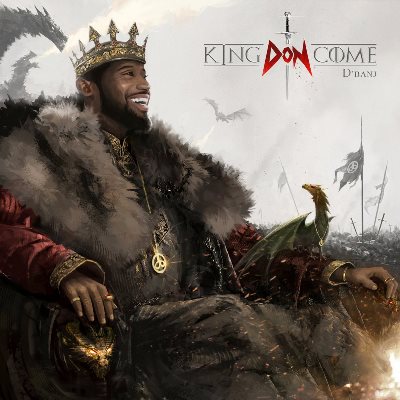D’Banj is John the Baptist to Wizkid, Davido and Mr.Eazi’s Jesus Christ, it was he who paved the way for Afropop to be accepted on a broader scale internationally.
D’Banj was already a legend back home but the success of “Oliver Twist” in the UK encouraged major record companies to put money behind Nigerian artists and push them around the world in ways we hadn’t seen since Majek Fashek in the late 80’s. Unfortunately, John doesn’t have a whole 2,000 year plus religion dedicated to him, Jesus does, and in this what-have-you-done-for-me lately world of pop music, “Oliver Twist” feels like it happened an awful long time ago.
It has also been 5 years since Mo’Hits split up. The divorce was public and messy, and fans understandably picked sides. Having been unfairly portrayed as the selfish and overambitious parent, D’Banj came off worse than the likable Don Jazzy. So, after falling out with his longtime partner, the singer also fell out of love with the fans, and his last two project D’Kings Men (2013) and An Epic Journey (2015) failed to connect.
Thankfully, D’Banj was finally able to make a comeback last year with “Emergency”, the Afrobeat-inspired record became the 7th most played song on Nigerian radio in 2016. “Emergency” was the Kokomaster’s biggest hit since “Oliver Twist”, so including those two records on King Don Come should make the sales and streaming numbers look hefty in a week or so.
However, even with those very familiar songs included, expectations for this album aren’t very high. We have waited a long time too; King Don Come may be D’Banj’s first solo album in nearly 10 years, but it’s a project that puts the veteran pop star in this interesting position where, even after all he’s achieved, he knows he still has something to prove.
As a result, there’s a self-indulgent and defensive spirit around KDC that sounds like it’s coming from a place of insecurity. The original version of “Focus” contained a number of bold assertions D’Banj made about opening doors for the new generation and about his standing in the game, assertions Davido challenged but later claimed that he never did. Interestingly the album version cuts a lot of that showboating out and evolves from a controversy-starting ego trip to a playful turn-up record.
“It’s Not A Lie” remains unchanged, however, Harrysongs’ catchy chorus asks and answers questions about D’Banj’s standing in the game – again.
The world is feeling D’Banj, abi I lie? (It’s not a lie)
He make the people to dance, abi I lie? (It’s not a lie)
There’s a thin line between demanding respect and begging for it, “It’s Not A Lie” comes dangerously close to crossing that line, but at the same time, you can also see that D’Banj isn’t waiting for anyone to blow his trumpet, he’s decided to blow his own harmonica by himself instead.
“As I Dey Go” strikes a more measured and reflective tone. God has seen the singer through the hard times, and he’s grateful, but even at his lowest points, D’Banj wants his haters to know that he was still able to maintain his ostentatious lifestyle. The song pushes back on the rumor that the flashy singer is in debt and struggling financially.
One other thing that has plagued D’Banj post-Mo’Hits is his inability to find a producer to help redefine his sound. Problem solved, it seems. KDC was largely produced by one man, DK Media’s in-house producer Cheeky Chizzy. Cheeky’s steadiness behind the board is probably the reason why an album of 12 songs, designed to appeal to a variety of audiences from South African fans to Nigerian fans to Spanish and French fans and more, gels together sonically.
Album cohesion aside, the two also seem to have struck up a good working relationship. Take the love songs “Shoulda” and “Be With You” for instance, two song where, since the production isn’t overbearing, more is required from D’Banj vocally. These are the types of moments where the entertaining but artistically limited singer has been found out in the last few years. This time around however, D’Banj sounds comfortable holding a note.
Being that D’Banj hinged his brand on sex and women, it was always going to be interesting to see how marriage and fatherhood would change his music topically. His infamous Kokomaster playboy persona has noticeably been de-emphasized on King Don Come, the songs on the album instead were written from a number of other creative angles. The most fascinating is “El Chapo”, a Maleek Berry-produced trunk rattler, where D’Banj evolves into this gun-toting, tough-talking drug kingpin alongside his accomplices, Gucci Mane and Wande Coal. Drug talk and gang banging is obviously more of Gucci’s area of expertise but with clever lines delivered with supreme confidence, the 2 ex-label mates both floored their more illustrious, more experienced guest.
Pulling an artist like Gucci on KDC is an indication that D’Banj clearly hasn’t given up on his plans for global domination – the very thing that reportedly caused Mo’Hits to split in the first place. His new album King Don Come is also being distributed in the US via Priority Records, after the deal with GOOD Music fell through. King D’Banj is still intent on conquering new territories even as he mounts up a serious fight for his old one.


